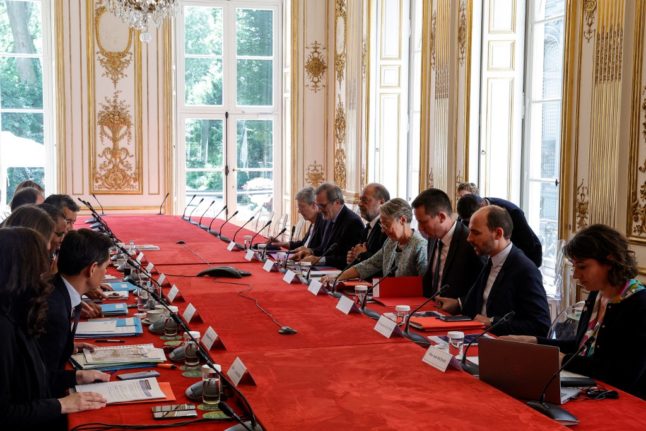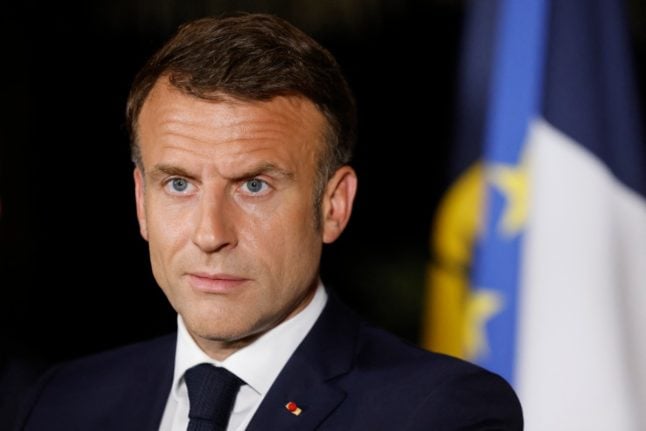Many of the biggest names of the government are remaining in post after Macron opted for a fairly limited remaniement (reshuffle) on Thursday.
Despite widespread rumours that she would lose her job after the bitterly divisive pension reform, Elisabeth Borne remains in post as prime minister. Likewise finance minister Bruno Le Maire – Macron’s longest-serving minister who has been in the same role since 2017 – and interior minister Gérald Darmanin.
Although many of the newcomers are not well known names, many of them are Macron loyalists, with an emphasis on political experience rather than the appointment of outside experts to ministries.
The Council of Ministers – complete with newly appointed ministers – will meet on Friday morning, where Macron will address the new team. He then heads off to the Pacific for a series of diplomatic meetings, while the Assemblée nationale completes its final sessions before the summer break.
The month of August normally sees limited political activity in France as the country heads off on holiday, with la rentrée in September marking the presentation of a new programme of policies from the ruling party.
Here are the new ministers;
Gabriel Attal – Education minister. Not a newcomer to government, the 34-year-old Attal has previously been government spokesman and public accounts minister. He replaced Pap Ndiaye – an outside appointment who previously worker as an academic and was best known for his work on race relations.
Aurélien Rousseau – Health minister. A technocrat who previously ran the office for Elisabeth Borne, Rousseau was in charge of the Paris regional health authority during the pandemic. Unusually in a country where the health minister is often a doctor, he has no medical qualifications. He replaces François Braun, a civil servant who had previously run the ambulance service.
Aurore Bergé – Solidarity minister. Considered a close ally of Macron and the leader of his party in the Assemblée nationale, Bergé becomes the junior minister at the health ministry, the number two to Aurélien Rousseau. She replaces Jean-Christophe Comb, the former head of the Red Cross in France, in the role.
Sabrina Agresti-Roubache – minister for urban affairs. A relative newcomer to parliament, she was elected MP for Bouches-du-Rhône (including Marseille) in 2022. Reputed to be close to Macron, she was formerly a producer who worked on the fabulously trashy Netflix series Marseille – a political drama centred around the (fictional) mayor of Marseille.
Bérangère Couillard – equalities minister. Moving from the environment ministry is MP for Gironde. She replaces Isabelle Rome.
Sarah El Haïry – Biodiversity Minister. Former youth minister Sarah El Haïry moves to the newly created role of biodiversity minister, part of the gradual expansion of the environment ministry.
Philippe Vigier – minister for overseas territories. Vigier is an MP for the centrist party MoDem, the major allies of Macron’s party in parliament. He replaces Jean-François Carenco.
Patrice Vergriete – housing minister. Currently the mayor of Dunkirk, Vergriete has a background in urban planning and housing.
Thomas Cazenave – budget minister. The MP for the Gironde area (around Bordeaux) steps into the junior finance ministry role vacated by Gabriel Attal.
Fadila Khattabi – Minister for disabilities. Former president of the commission for social affairs, she replaces Geneviève Darrieussecq in the role.
Social economy minister. The previous holder of the post, Marlène Schiappa will leave the government after a series of controversies – the most serious being the ongoing investigation into the use of funds from a charitable organisation designed to combat extremism which she was responsible for running. She also made headlines when she appeared – clothed – in Playboy magazine. Her responsibilities will be divided between other junior ministers in the finance ministry.
The rest of the ministers remain in their previous positions. They are;
Prime Minister – Élisabeth Borne
Finance Minister – Bruno Le Maire
Interior Minister – Gérald Darmanin
Foreign Minister – Catherine Colonna
Government spokesperson – Olivier Véran
Environment Minister – Christophe Béchu
Minister of Energy Transition – Agnès Pannier-Runacher
Agriculture Minister – Marc Fesneau
Justice Minister – Éric Dupond-Moretti
Defence Minister – Sébastien Lecornu
Labour Minister – Olivier Dussopt
Culture Minister – Rima Abdul Malak
Minister of higher education – Sylvie Retailleau
Minister of Public functions – Stanislas Guerini
Minister of sports and the Olympics/ Paralympics – Amélie Oudéa-Castéra
Junior ministers
Minister for relations with Parliament – Franck Reister
Minister for childhood- Charlotte Caubel
Minister of the seas – Hervé Berville
Minister of industry – Roland Lescure
Minister of digitalisation and telecommunications – Jean-Nöel Barrot
Minister of small businesses and tourism – Olivia Grégoire
Minister of territorial collectivities and rurality – Dominique Faure
Minister of citizenship – Sonia Backès
Minister of external commerce and France abroad – Olivier Becht
Europe Minister – Laurence Boone
Minister of development and the Francophone world/ international partners – Chrysoula Zacharopoulou
Minister of remembrance of former soldiers – Patricia Mirallès
Minister of youth education and training – Carole Grandjean
Minister of transport – Clément Beaune
Minister for healthcare workers – Agnès Firmin le Bodo



 Please whitelist us to continue reading.
Please whitelist us to continue reading.
Member comments